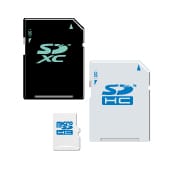FAQ
- Why do I need to format an SD memory card?
- What are the benefits of using the SD Memory Card Formatter?
- What should I know before I begin formatting?
- Is there an End User License Agreement (EULA)?
-
What is the SD Memory Card Formatter Version Check? (Version 5.0 or
later) - Is the old SD Memory Card Formatter(Version 4.0 or prior) available?
-
Can an SD memory card be reformatted with other than SDA standard FAT
file systems? - Is the SD Memory Card Formatter available on websites other than the SDA website?
- Does SDA allow users to link to the SD Memory Card Formatterdownload page on the SDA
website? -
Why are the displayed capacities different in Windows and Mac
applications? - Why is free space after formatting different between the SD Memory Card Formatter and
macOS Disk Utility or Windows Drive Properties dialog? -
How many characters can be entered into the volume label field?
-
What is the difference between Quick and Overwrite format methods?
-
What types of adapters are supported by the SD Memory Card
Formatter? -
Why is my SDUC or microSDUC card not being recognized and not operating normally in my product?
- I see internal HDDs listed on SD Card Formatter for Windows.
-
Who can I contact with questions about the SDA SD Memory Card
Formatter?
Why do I need to format an SD memory card?
- There are several reasons to format your SD cards. While new cards are usually ready to be used in general devices like computer, laptops and digital cameras, many other products will need an SD memory card formatted to match certain OS customizations required to properly save and retrieve data between the device and SD memory card. And, if a card is re-formatted by another tool other than the trusted offering provided by the SD Association, the user risks having their card to not work effectively in certain devices.
Formatting also ensures your card is free of viruses and bugs, corrects any
performance challenges, and fixes issues caused by improperly removing the card if the Safely Remove feature wasn’t applied. Our Formatter ensures the card you are relying on to capture content for your next important project, photoshoot, etc. is in optimal operating condition.
What are the benefits of using the SD Memory Card Formatter?
-
CE companies, professional power users and consumers trust the SD Memory Card Formatter to best prepare their media as it’s an always up-to-date tool provided by the global experts behind the industry’s SD Association. We are continuously supporting and evolving the storage cards that millions of people rely on each day around the globe. Feel confident in what you’re about save to your SD card by working with the Formatter developed and trusted by the world’s leading SD card
manufacturers. Only the SD Memory Card Formatter can restore cards to factory settings to make it easier to use them across a variety of devices and operating systems.The SDA Formatter offers:
- Data portability of SD memory cards among SD host products like computers, digital still cameras, digital video camcorders, broadcast recorders, set top boxes, drive recorders, smartphones, drones and many other devices.
- Formatting within FAT parameters optimized for flash memories in SD memory cards for better performance and endurance.
What should I know before I begin formatting?
-
- First, ensure you have the newest version of SD Memory Card Formatter downloaded from www.sdcard.org.
- Next, if there is any data you want to save that’s stored on your memory card, always make sure a copy of it is stored elsewhere before you begin the formatting process. Depending on which formatting option you select, the card may be erased and all data will be removed.
- Check the position of the write protect switch on your card before formatting. The position should be in NOT PROTECTED mode (i.e., positioned upward).
- The Overwrite format process can be long depending on the size and speed of the card. Ensure your computer is connected to a power supply and that sleep mode is disabled.
- Finally, execution of the SD Memory Card Formatter requires Administrator Rights for Windows and Mac OS X/macOS. Confirm you have such access before beginning.
Is there an End User License Agreement (EULA)?
- Yes. When downloading from the SDA website or installing the SD Memory Card Formatter onto your Windows PC or Mac, the EULA will be shown on the screen. The EULA is the SD Memory Card Formatter software license agreement between SDA and you. You must accept the EULA to install and use the Formatter.
What is the SD Memory Card Formatter Version Check? (Version 5.0 or later)
- If your Windows PC or Mac is connecting to Internet, when you run the SD Memory Card Formatter you installed on your Windows PC or Mac, it will check for the latest version of the Formatter from the SDA website. If your Formatter is not the latest version, the Formatter will ask you to upgrade by downloading the latest version from the SDA website.
Is the old SD Memory Card Formatter(Version 4.0 or prior) available?
- No. Previous versions of the Formatter are not available. The old Formatter may not work properly with current Windows and Mac OS X/macOS versions. You should always use the most current version of the Formatter from our SDA website.
Can an SD memory card be reformatted with other than SDA standard FAT file systems?
- This is not recommended because you will lose the ability to use the card to reliably transfer data between SD memory card and SD host products. Some SD host products reformat SD memory cards other than SDA standard FAT file systems. This process may restrict the data portability of cards with other SD host products and create other issues. SD host product manufacturers should only reformat cards using
the defined SDA standard FAT file systems.
Is the SD Memory Card Formatter available on websites other than the SDA website?
- The SDA’s Formatter is only available at www.sdcard.org. Do not use the SD Memory Card Formatters found on other websites. The SDA does not allow the copy of the SD Memory Card Formatter to be hosted on other websites. The SDA download is free, and always provides the latest version of the Formatter.
Does SDA allow users to link to the SD Memory Card Formatter download page on the SDA website?
- Yes, we encourage the industry to point colleagues, partners, customers and consumers to link to the following SD Memory Card Formatter download page. Feel free to include the following URL in your product manuals, websites, promotional materials, etc.:
https://www.sdcard.org/downloads/formatter/
Why are the displayed capacities different in Windows and Mac applications?
- Windows uses a base-1024 to calculate capacities while Mac uses a base-1000 (e.g., in Windows, 1MB =1,024K kB = 1,048,576 bytes, while in Mac, 1MB = 1,000K kB = 1,000,000 bytes).
Why is free space after formatting different between the SD Memory Card Formatter and macOS Disk Utility or Windows Drive Properties dialog?
- The SD Memory Card Formatter formats the card without consideration of the operating system’s own file system driver. Once the formatting completed, the operating system’s file system driver mounts the card and creates hidden directories and files for its own purpose. The difference of free space right after formatting as reported by the Formatter and as reported by the operating system’s own dialog comes from those hidden directories and file creations.
How many characters can be entered into the volume label field?
- You can enter 11 ASCII characters or 5 characters in Japanese double-byte character.
What is the difference between Quick and Overwrite format methods?
- Quick format deletes all the file/directory entries by initializing file system parameters of the card, but it does not delete the data written in files. Overwrite format deletes file/directory entries by initializing file system parameters of the card (same as with Quick format) and erases all data by overwriting the user data area completely. Note that the Overwrite format takes more time to complete than the Quick format method.
What types of adapters are supported by the SD Memory Card Formatter?
-
The following SD interface devices are available to access SD/SDHC/SDXC memory cards:
- SD memory card slot on Windows PC or Mac
- USB2.0, USB3.0, USB3.1, USB-C SD Memory card reader connected to Windows PC or Mac
Why is my SDUC or microSDUC card not being recognized and not operating normally in my product?
- The Formatter was updated to format SDUC memory cards (cards over 2TB of capacity). SDUC memory cards use an enhanced SD protocol that requires updated SD drivers in many host products. Therefore, if you encounter any issues with your SDUC memory card operation, make sure to update your product’s drivers to the latest version supporting SDUC.
I see internal HDDs listed on SD Card Formatter for Windows.
- Please uninstall the current version and download again from the SD Associations website and reinstall.
Who can I contact with questions about the SDA SD Memory Card Formatter?
- If you have questions about the SD Memory Card Formatter or want to learn more about how you can point partners, consumers and customers to our trusted resources, please email the SDA team members at help@sdcard.org
Learn more before you format by reviewing the SD Card Formatter User’s Manual here:



